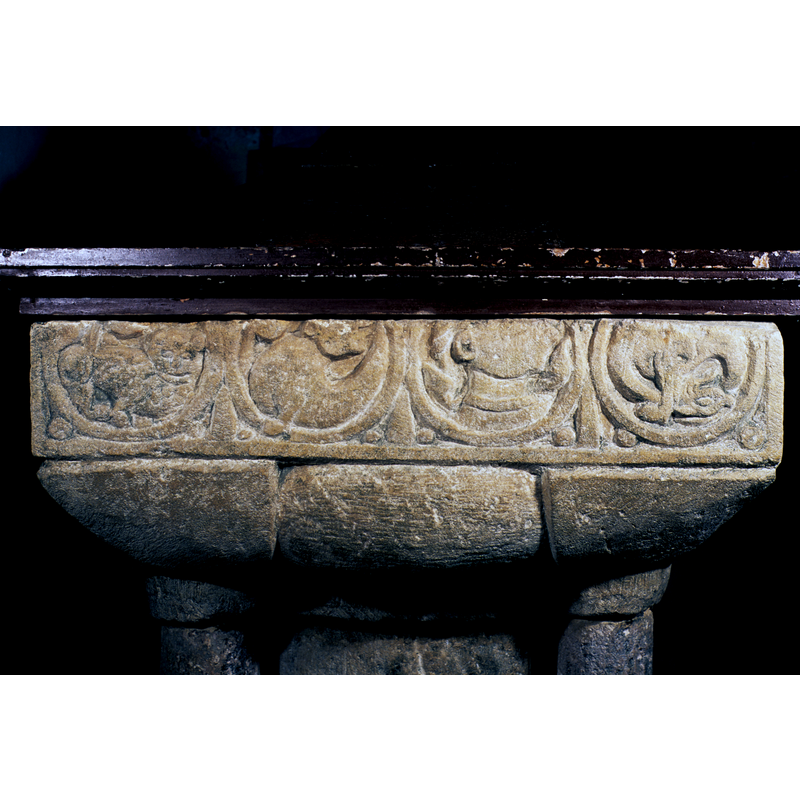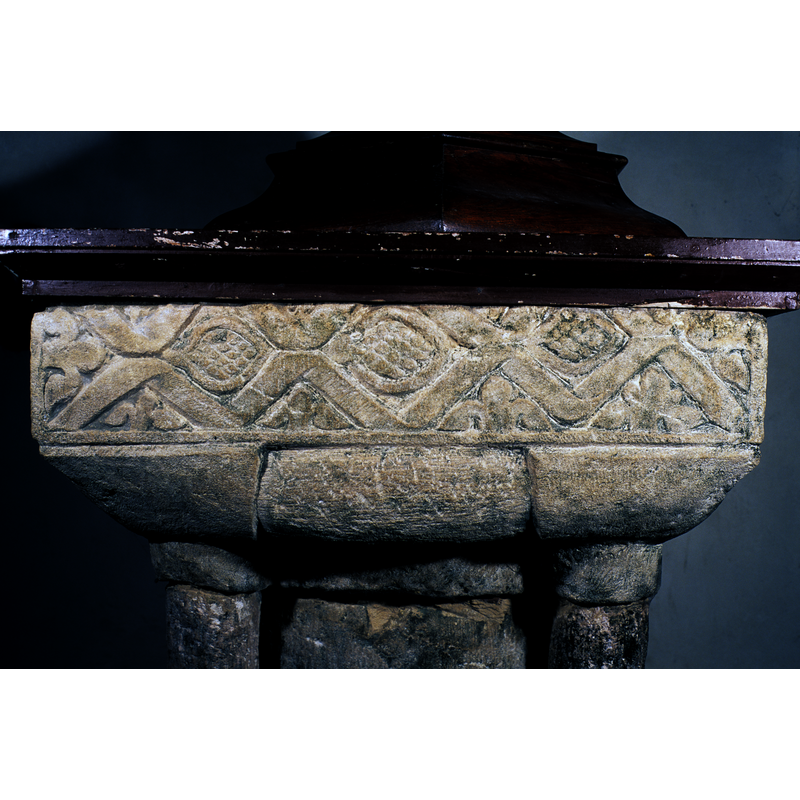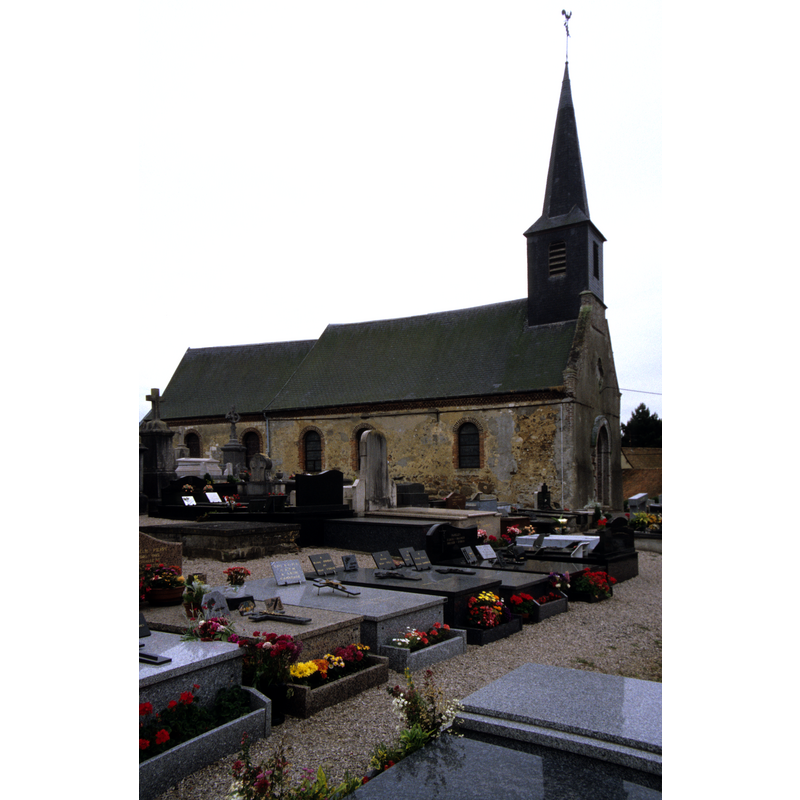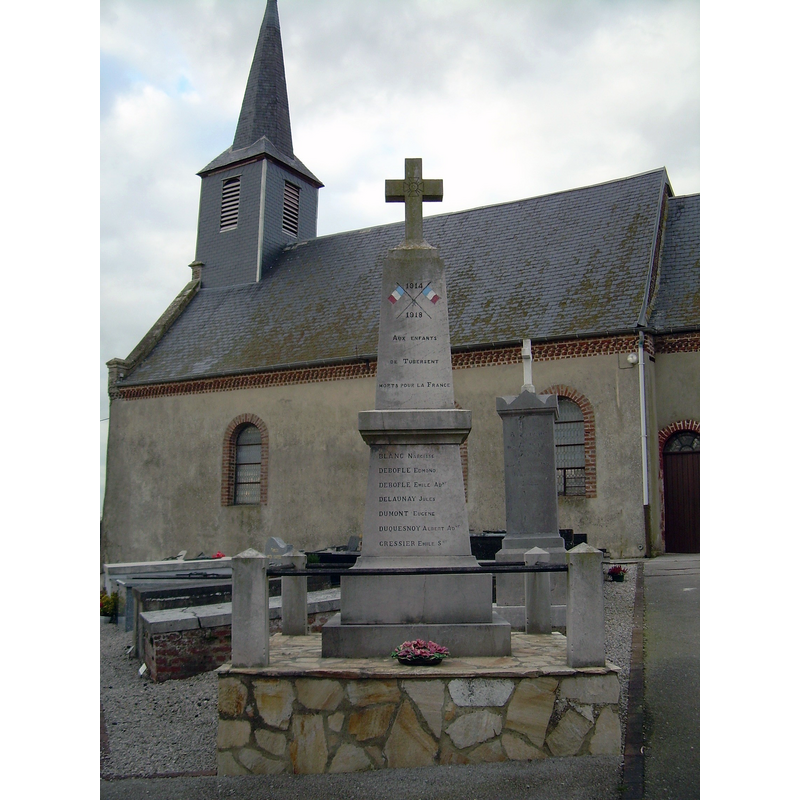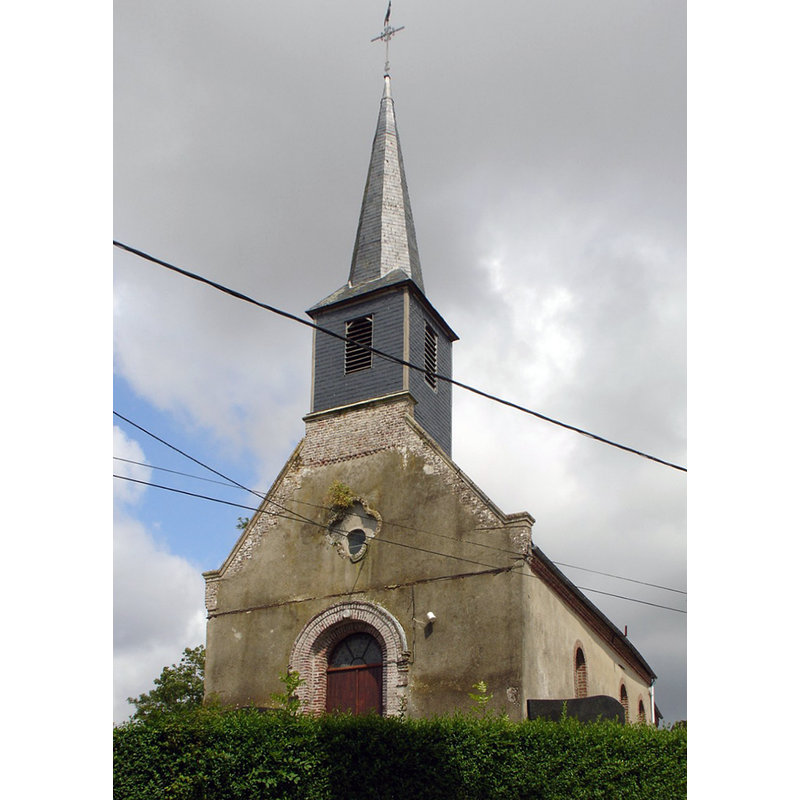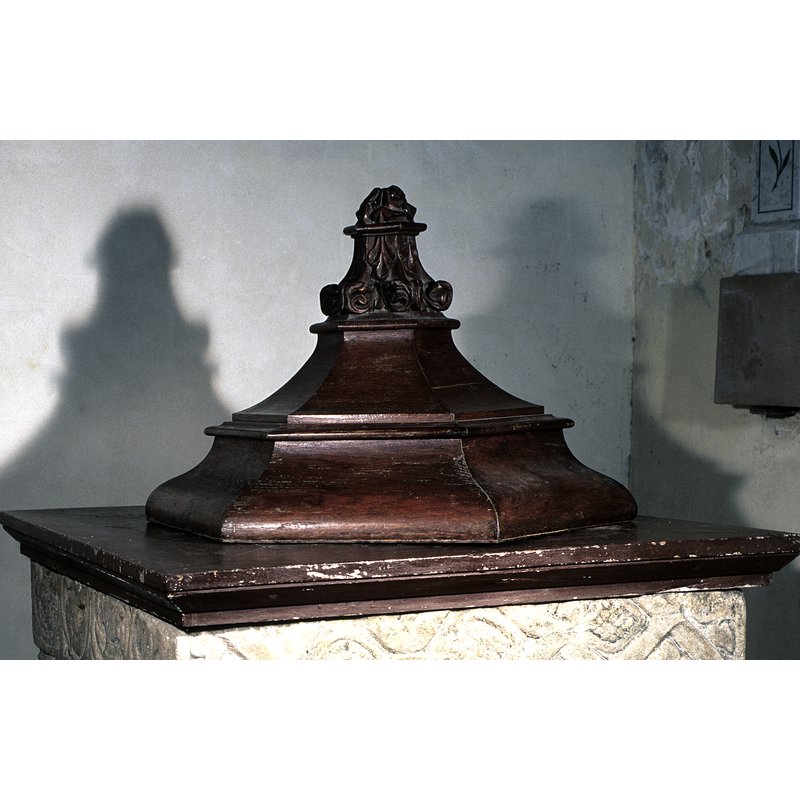Tubersent / Thorbodessem / Thornbodeshem / Torbodessa / Tubesent / Turbodessem
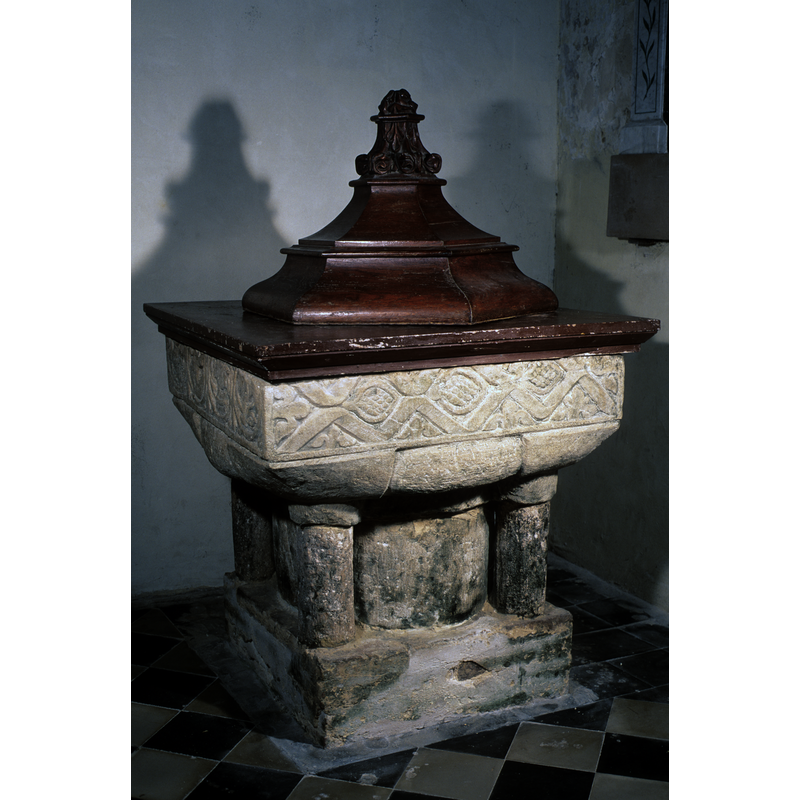
Image copyright © Baptisteria Sacra Index, 2023
CC-BY-NC-ND-4.0
Results: 14 records
view of font and cover
inscription
animal - mammal - lion - gardant - in a circle
animal - fabulous animal or monster - unidentified - in a circle
human figure - head - in a circle
animal - fabulous animal or monster - dragon - biting its own tail (ouroboros)
Scene Description: in the rightmost circle; the body of the animal faces left but its head goes under and around towards the right to bite its own tail
Copyright Statement: Image copyright © Baptisteria Sacra Index, 2023
Image Source: digital image of a photograph taken 21 June 2000 by BSI
Copyright Instructions: CC-BY-NC-ND-4.0
design element - motifs - ball, bead or pellet
symbol - fruit - arum or grape - 3
design element - motifs - ribbon - 2
Scene Description: two mirror-like ribbons with folds at the angles, creating romboid spaces that frame the bunches of arum (?)
Copyright Statement: Image copyright © Baptisteria Sacra Index, 2023
Image Source: digital image of a photograph taken 21 June 2000 by BSI
Copyright Instructions: CC-BY-NC-ND-4.0
design element - motifs - foliage - trefoiled leaves
Scene Description: a schematic trefoiled plant or foliage in avery spandrel created by the ribbons; (Drake (2003: 344) describes them as "'piles' flanked by heads" but on close inspection they are definitely vegetal motifs; one or two may suggest the schematic rendering of a cherub
Copyright Statement: Image copyright © Baptisteria Sacra Index, 2023
Image Source: digital image of a photograph taken 21 June 2000 by BSI
Copyright Instructions: CC-BY-NC-ND-4.0
view of church exterior - northwest view
view of church exterior - south view - detail
Scene Description: the Tubersent war memorial by the south side of the church
Copyright Statement: Image copyright © Loïc Vambre, 2007
Image Source: digital photograph taken 26 February 2007 by Loïc Vambre [https://commons.wikimedia.org/wiki/File:Tubersent_monument_aux_morts.jpg] [accessed 28 July 2017]
Copyright Instructions: CC-BY-SA-3.0
view of church exterior - southwest view
INFORMATION
Font ID: 03138TUB
Object Type: Baptismal Font1
Date Visited: 2000-06-21
Font Century and Period/Style: 12th century, Romanesque
Workshop/Group/Artisan: Tournai font / Marquise [Enlart]
Cognate Fonts: Hesdres [and Newenden a/p Drake (2003)]
Church / Chapel Name: Egtlise paroissiale Saint-Etienne
Font Location in Church: Inside the church, at the W end, N side
Church Patron Saint(s): St. Stephen
Church Notes: present church 16thC; modified 19thC
Church Address: impasse de l'Eglise, 62630 Tubersent, France
Site Location: Pas-de-Calais, Hauts-de-France, France, Europe
Directions to Site: Located off the D145, just N of Saint-Josse, 6 kms E of Etaples, 9 km E of Le Touquet, about 30 km SSE of Boulogne-s-Mer, about 6 kms E of Etaples. There are many such fonts listed for this area.
Ecclesiastic Region: Diocèse d'Arras [Boulogne?]
Historical Region: Le Boulonnais
Font Notes:
Click to view
The old baptismal font at Tubersent is noted as "très remarquables" in the Dictionnaire historique et archéologique du Département du Pas (Arras: Sueur-Charruey, 1875), vol. 3, p. 127. Listed and illustrated in Enlart (1890) and (1902) as a late-12th century Marquise font on a 5-support base decorated with medallions containg several motifs and symbols. Classed as 'monument historique' 11 March 1902: "Sur la proposition du Directeur des Beaux-Arts, ARRÊTE : Article 1er. — Les fonts baptismaux en pierre, du XIIe siècle, conservés dans l'église de Tubersent (Pas-de-Calais), sont classés parmi les monuments historiques. Article 2. — Le présent arrêté sera notifié au Préfet du département du Pas-de-Calais, au Maire de la commune de Tubersent et au Trésorier du Conseil de fabrique de l'église de cette commune, qui seront responsables, chacun en ce qui le concerne, de son exécution. Paris, le 11 mars 1902." Described and illustrated in Drake (2003), who relates it to the fonts at Hesdres and Newenden, the latter newly identified in Drake as a produce of the Boulonnais. Listed in Palissy [ref.: PM62001602] as a baptismal font of the 12th century: "Pilier cylindrique cantonné de quatre colonnettes engagées portant une cuve quadrangulaire, le tout en calcaire oolithe." On-site notes: slightly irregular square (83 x 87 cm) basin mounted on a plain cylindrical central column with four constructional colonnettes at the corners (one of them missing - June 2000); the ornamentation of the basin is in line with other Tournai-type fonts: one side has four circles containing each: a lion, an unidentified animal, a face or mask and another unidentified animal; the second side has a pattern of double zig-zag with vine and grapes or arum in the gaps; the third side is blank escept for the date "1430" inscribed on it [the date is too late to be the original date of manufacture of the font]; the fourth side has four circles containing each: a rosette, and eagle, a face and an animal. There has been further manipulation of this font: the basin well was filled with concrete and a marble double bowl inserted in it at some point in the past.
COORDINATES
UTM: 31U 408220 5597316
MEDIUM AND MEASUREMENTS
Material: stone, limestone [calcaire oolithe]
Font Shape: square, mounted
Basin Interior Shape: now has a double bowl
Basin Exterior Shape: square
Height of Basin Side: 17 cm
Basin Total Height: 35 cm
Height of Base: 59 cm
Font Height (less Plinth): 94 cm
Square Base Dimensions: 70 x 70 cm
Trapezoidal Basin: 83 x 87 cm
Notes on Measurements: BSI on-site [NB: inside measurements not available due to the reconstruction of the basin well]
INSCRIPTION
Inscription Language: numbers
Inscription Location: Side of the basin
Inscription Text: "1430"
Inscription Notes: Incised on an otherwise blank side; a later addition
Inscription Source: BSI on-site
LID INFORMATION
Date: modern
Material: wood
Notes: Partly pyramidal with finial.
REFERENCES
- Anchel Balaguer, Constantino, "La iniciación cristiana de Josemaría Escrivá: bautismo, confirmación y primera comunión", XI [separat del Anuario de Historia de la Iglesia, no. 6 (2002: 75-101), Cuadernos del Centro de Documentación y Estudios Josemaría Escrivá de Balaguer, 2002
- Enlart, Camille, "Etude sur quelques fonts baptismaux du nord de la France: Mémoire présenté au Congrès de la Sorbonne", 1890, Bulletin archéologique du Comité des travaux historiques et scientifiques, 1890, pp. 46-73; p. 56 and fig. 5
- Enlart, Camille, Manuel d'archéologie française depuis les temps mérovingiens jusqu'à la Renaissance, Paris: Alphonse Picard & fils, 1902, p. 767 footnote 1; p. 777 footnote 1 and p. 779

